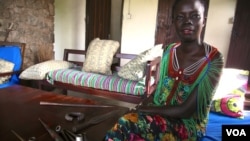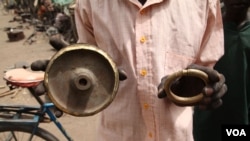RUMBEK, SOUTH SUDAN —
Africa’s longest-running civil war left South Sudan in ruins when it split from the north in 2011. But the country’s artisans are literally picking up the old shell casings from artillery fire that used to terrorize the population, and are making jewelry out of it in the “bullet bangle” business.
On the outskirts of Rumbek, capital of South Sudan’s Lakes state, a symphony of smashes and clangs rings out from dusk till dawn, as a row of blacksmiths hammer away at old metal shells and craft them into works of art.
John Panchol, a slight man with bulging muscles from the backbreaking labor, has been making things from bullet and artillery casings for years.
He used to mostly make traditional weapons, in a place where violent cattle raids are still common.
"Before I was making bracelets, I was only making spears, axes and knives," said Panchol.
Growing demand
The raiders use deadlier, modern guns now. But Panchol has found that the growing demand for art and jewelry made from bullets - so-called "bullet bangles" - is becoming his new bread and butter.
He finds that some of his best customers are Rumbek's cows. This is cattle country, where cows outnumber humans, and many people are named after their father’s favorite bull or best milker.
"I’m not just making bracelets," he said. "I’m producing bells for the cows and some spears that are luxury [items]. People love these things."
Panchol learned his trade from a man who, in his prime, bashed out thousands of products. He is now so old he mostly stays at home or shuffles around town with a stick, but Panchol has taken on three apprentices so the craft will continue.
One, John Chol, who lost his construction job in the capital, Juba, hopes that he will be able to retire on his skills, but said the problem is supply of raw material.
"It’s difficult to get the metal, the remains of the ornaments that we get," said Chol. "Some people supply us, but we also have to look hard. We will carry on doing it, though."
Seeking raw material
Their searches take them hundreds of kilometers away to areas like Abyei, a contested region on the Sudan-South Sudan border.
South Sudan split peacefully from the north in 2011, but disputes over a largely undefined border and how to share revenues from oil wells, now mostly in the South, sparked weeks of fighting last year that many feared would take the two sides back to all-out war.
South Sudanese fashion designer Akuja de Garang is one person who is trying to promote the new nation’s struggling artisans and preserve their gifts for future generations.
De Garang, who like many others fled a war that killed an estimated 2 million people and forced countless more to choose fight or flight, spent most of her life in Britain where she studied anthropology.
Her house bears some of the beautiful trinkets made by around 70 ethnic groups spread across South Sudan. They include intricate pipes of wood encased in smoothed-down bullets, and engraved, razor-sharp spears usually brandished by tribal "wise men."
Creating a network
She wants to put South Sudan on the map for more than its violent past, and support artists like the metalworkers by providing small loans, a market for buyers in the capital, and advice on prices that will reflect the blood, sweat and tears of their toil.
“What I’m trying to do with the organization I’ve set [up] is to offer an opportunity to act as a market. So what I’m trying to do is to set up a network across the 10 states,” said de Garang.
She said "bullet bangle" artists also are helping to clean up a country littered with bullets, shell casings and other remains of years of war.
Ironically, the business of crafting art and jewelry out of scraps of military metal is likely to die out - due to a lack of raw materials - if this new nation can maintain peace with Sudan. For now, artisans are turning pieces of war into pieces of art.
On the outskirts of Rumbek, capital of South Sudan’s Lakes state, a symphony of smashes and clangs rings out from dusk till dawn, as a row of blacksmiths hammer away at old metal shells and craft them into works of art.
John Panchol, a slight man with bulging muscles from the backbreaking labor, has been making things from bullet and artillery casings for years.
He used to mostly make traditional weapons, in a place where violent cattle raids are still common.
"Before I was making bracelets, I was only making spears, axes and knives," said Panchol.
Growing demand
The raiders use deadlier, modern guns now. But Panchol has found that the growing demand for art and jewelry made from bullets - so-called "bullet bangles" - is becoming his new bread and butter.
He finds that some of his best customers are Rumbek's cows. This is cattle country, where cows outnumber humans, and many people are named after their father’s favorite bull or best milker.
"I’m not just making bracelets," he said. "I’m producing bells for the cows and some spears that are luxury [items]. People love these things."
Panchol learned his trade from a man who, in his prime, bashed out thousands of products. He is now so old he mostly stays at home or shuffles around town with a stick, but Panchol has taken on three apprentices so the craft will continue.
One, John Chol, who lost his construction job in the capital, Juba, hopes that he will be able to retire on his skills, but said the problem is supply of raw material.
"It’s difficult to get the metal, the remains of the ornaments that we get," said Chol. "Some people supply us, but we also have to look hard. We will carry on doing it, though."
Seeking raw material
Their searches take them hundreds of kilometers away to areas like Abyei, a contested region on the Sudan-South Sudan border.
South Sudan split peacefully from the north in 2011, but disputes over a largely undefined border and how to share revenues from oil wells, now mostly in the South, sparked weeks of fighting last year that many feared would take the two sides back to all-out war.
South Sudanese fashion designer Akuja de Garang is one person who is trying to promote the new nation’s struggling artisans and preserve their gifts for future generations.
De Garang, who like many others fled a war that killed an estimated 2 million people and forced countless more to choose fight or flight, spent most of her life in Britain where she studied anthropology.
Her house bears some of the beautiful trinkets made by around 70 ethnic groups spread across South Sudan. They include intricate pipes of wood encased in smoothed-down bullets, and engraved, razor-sharp spears usually brandished by tribal "wise men."
Creating a network
She wants to put South Sudan on the map for more than its violent past, and support artists like the metalworkers by providing small loans, a market for buyers in the capital, and advice on prices that will reflect the blood, sweat and tears of their toil.
“What I’m trying to do with the organization I’ve set [up] is to offer an opportunity to act as a market. So what I’m trying to do is to set up a network across the 10 states,” said de Garang.
She said "bullet bangle" artists also are helping to clean up a country littered with bullets, shell casings and other remains of years of war.
Ironically, the business of crafting art and jewelry out of scraps of military metal is likely to die out - due to a lack of raw materials - if this new nation can maintain peace with Sudan. For now, artisans are turning pieces of war into pieces of art.





